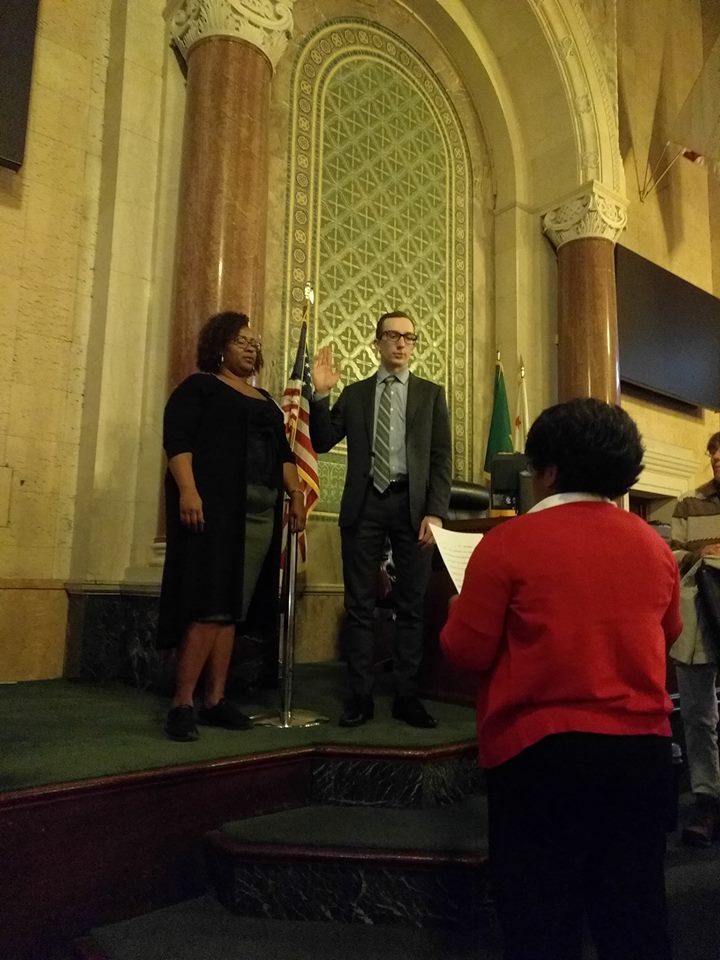Student chosen for LA Health Commission

Ever since senior Matthew Crane formed a close bond with a trauma surgeon at a local hospital he worked at, he knew he wanted to be a public health professional.
Now, the human biology major and Undergraduate Student Government Speaker Pro Tempore has become the youngest person ever elected as a Los Angeles City Health Commission.
Crane was sworn in on March 11, and will represent the 13th district of Los Angeles.
“I thought what [the trauma surgeon] did was really interesting,” Crane said. “I saw how he took care of the whole community … I thought, ‘That’s what I want to do.’”
The Los Angeles City Health Commission’s goals are to evaluate the health needs of the city’s population, determine whether these needs are being met and implement cost-effective policies which address them, according to L.A. County Department of Public Health program director Nicole Vick.
“We provide policy recommendations on everything, from evaluating existing projects to proposing new ideas — trying to stem public health issues where they start,” Crane said. “Many of the things deal with social health disparities and advocacy on behalf of people who might not have as much of a voice in city council.”
Crane said his experience as a pre-med student, speaker pro tempore in Undergraduate Student Government, director of Emergency Medical Services at USC and president of the American Red Cross chapter at USC motivated him to approach medicine from the perspective of social advocacy.
“[I] saw a lot of problems with how education and public health was tackled by the campus,” Crane said. “I saw victims of sexual assault from my work [with EMS], and I saw issues of homelessness around USC with the Red Cross. I thought, ‘There’s got to be a better way to do this.’”
Crane worked with USG Sen. Jillian Halperin, a junior majoring in communication, and other senators to create the Bystander Intervention Training Program, a project that requires at least one executive board member of every registered student organization to undergo training to learn how to intervene in unsafe situations.
“He … chaired [the project] and was really helpful in coordinating with so many different campus partners in making sure that we could get the project funded,” Halperin said. “We really couldn’t have done that without him.”
Crane said that he often notices parallels between his work experience as a student and his current position as health commissioner, since they both entail serving and advocating for the well-being of specific communities.
“Making the biggest impact on the community is something that I find personally rewarding,” Crane said. “When you look at really big issues — whether it’s homelessness in Los Angeles or sexual assault at USC — these are things that really need to be targeted with policies … that are wide-reaching. I think that public health is the way that you … solve those problems.”
Vick said she first met Crane when he reached out to her for an internship opportunity after she came to speak at a USC Red Cross chapter meeting in 2017.
“I’m really happy that he took the initiative to ask,” Vick said. “I did not have a formal intern application … he just asked for the opportunity and we figured it out.”
As an intern, Crane was the primary author of the commission’s 2018 annual report, which presented and addressed a wide variety of issues facing the L.A. community, ranging from disease outbreaks to public bathroom availability.
“The report establishes background for a lot of different areas of improvement within Los Angeles — things like sobering centers and public bathroom availability,” Crane said. “It provides a summary of where the issue is at right now, and then it provides policy recommendations.”
After working on the annual report and reading an article about UC Berkeley students being sworn into commissions, Crane said he was motivated to become a member.
“There were a few vacancies in the health commission,” Crane said. “I thought, ‘I’ll toss my resume in,’ and I got picked.”
Vick said she has no doubt that Crane will continue to pursue public health advocacy as a commission member with the same passion and drive he had as an intern.
“I think this is going to be an extension of who he has been as an intern — very forward-thinking, anticipatory, coming up with new ideas, always willing to take that extra step,” Vick said.
Crane said he has a lot to learn from the veterans in his commission and is excited to implement concrete policies that will benefit the community.
“There’s a lot of adults very experienced in politics [in the commission], and I’m just trying to catch up and learn what political advocacy looks like at that level,” Crane said.
The commission and Crane are currently focused on drafting a resolution — set to be published next month — concerning health issues impacting citizens on Skid Row.
“There was a recent Typhus outbreak, and right now, that’s a big focus for the city health commission,” Crane said. “We’re drafting a letter to the mayor regarding pest-resistant trash bins and having those made available in Skid Row.”
Crane will work with the commission over the summer until October, and in Fall 2019, he will attend The Johns Hopkins University School of Medicine.
“They were my first choice: they’re the No. 1 school for public health,” Crane said. “It was a really great fit at the interview … I’ll be attending there in the fall, pursuing an M.D. and hopefully an M.P.H. [Master of Public Health].”
Halperin said she’s excited for the next chapter in Crane’s life.
“Whatever he puts his mind to, he’s just going to succeed,” Halperin said. “I can’t believe he’s graduating and moving on, but he’s truly an incredible person and an incredible colleague.”

